The High-Level Intergovermental Meeting on the Final Review of the Asian and Pacific Decade of Persons with Disabilities (HLIGM-FRPD), has started this morning at Fairmont Hotel, Jakarta, Wednesday (19/10). The meeting took place hybrid from 19 to 21 October, and attended by 53 member states of the United Nations of Economic and Social Commission for Asia and the Pacific (UNESCAP) and 9 associated members.
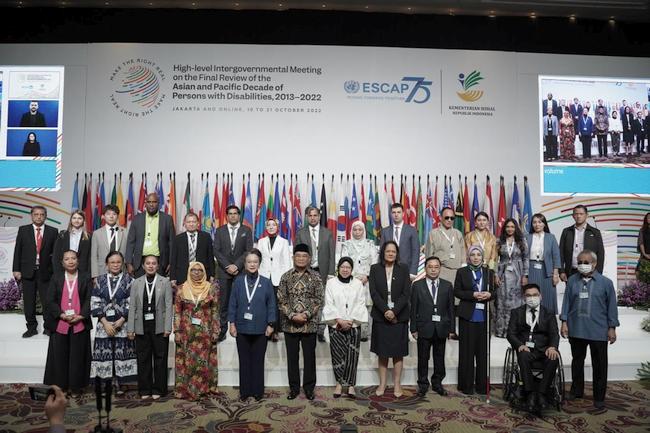
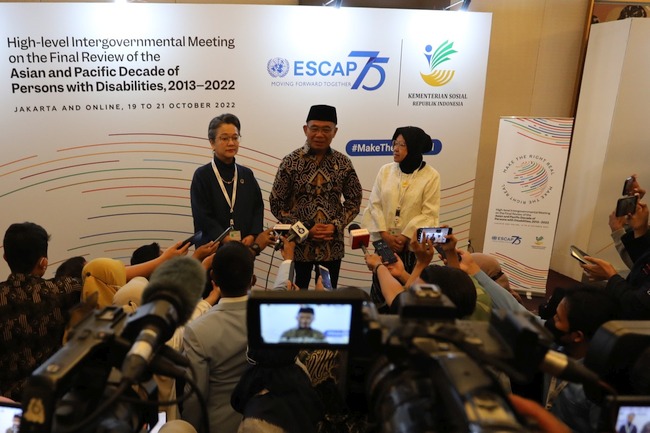
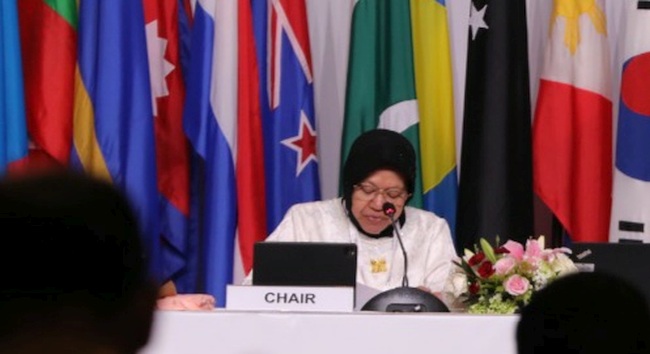
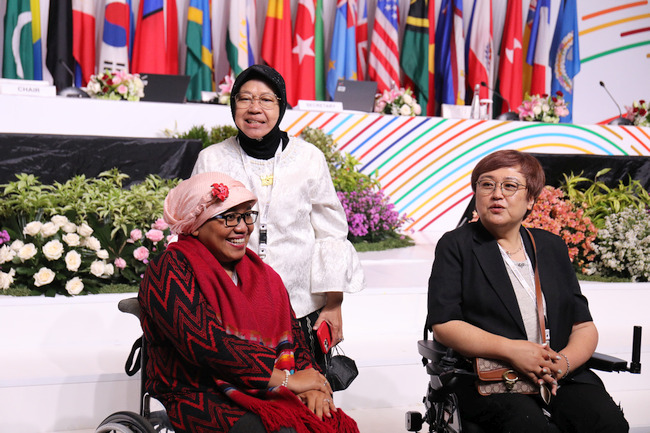
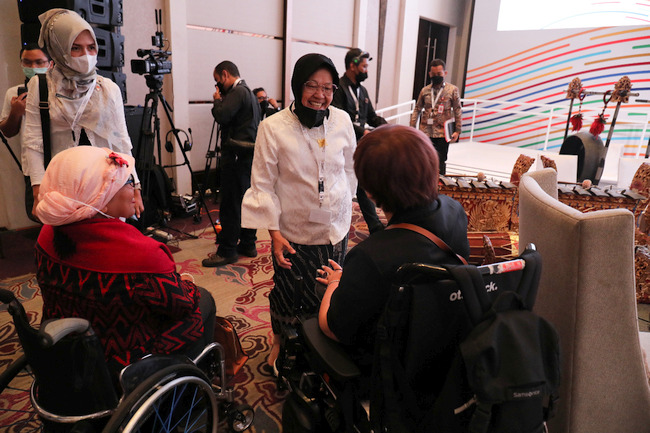
Representing the President of the Republic of Indonesia Joko Widodo, the Coordinating Minister for Human Development and Culture Muhadjir Effendy was present to open the meeting officially. In his speech, Muhadjir emphasized the commitment and strong support of Indonesian government in fulfilling and protecting the rights of persons with disabilities. “This can be seen in the implementation of policies and programs related to the persons with disabilities,” said Muhadjir Effendy.
On her keynote speech, Executive Secretary of UNESCAP and Under Secretary General of the UN, Armida Salsiah Alisjahbana expressed her appreciation to Indonesian government for organizing this event, especially for the Minister of Social Affairs Tri Rismaharini.
Armida stated that the aims of this conference were to review, assess the progress of the Incheon strategy implementation, after 10 years. The second, to build on the commitment of ESCAP members to improve accessibility for persons with disabilities, including access to inclusive public transportation and social rehabilitation efforts that have been carried out.
The third aim is to make some recommendations of future plans that mark the 4th decade of 2023 to 2032 which will be formulated as the Jakarta Declaration.
On the same occasion, Social Affairs Minister Risma delivered a country statement, emphasizing that Indonesian government has taken concrete steps in fulfilling and protecting disability rights, as evidenced by the issuance of Law No. 8/2016 on Persons with Disabilities.
“With this provision, it marks an important movement in Indonesia from placing persons with disabilities as objects of assistance recipients, to becoming subjects who have rights and are actively involved in making decisions related to their own needs,” said the Minister of Social Affairs.
Implementation and Evaluation of Respect, Protection and Fulfillment of the Rights of Persons with Disabilities at the national and regional levels, the government also prioritizes persons with disabilities in a policy for a period of 25 years or known as the National Master Plan for Persons with Disabilities, followed by the National Action Plan on Human Rights.
Government Regulation 70 of 2019 on planning, implementation and evaluation of respect, protection and fulfillment of the rights of persons with disabilities.
“Recently, Indonesia also passed Law No. 12 of 2022 on the Crime of Sexual Violence as legal protection for women and children from all forms of sexual violence with a 1/3 heavier penalty if the victim is a person with a disability,” said Risma.
To further empower and protect persons with disabilities and create an inclusive society, Indonesia launched Indonesia Visualize, Indonesia Hear, and Indonesia Take Steps programs. “Through these programs, accessibility and mobility tools are distributed and cataract surgery and physical therapy are carried out by campaigns to raise awareness in inclusion and capacity building,” said Minister Risma.
In 2021, the Ministry of Social Affairs has distributed 6,581 units of assistive devices, consisting of 757 units of electric wheelchairs, 354 units of commercial tricycle motorbikes, 5,420 units of adaptive sticks, and 50 units of blind water sensors. “Meanwhile, in 2022, it is targeted that 10,000 aid tools can be distributed,” added the Minister.
The Government of Indonesia is also increasing its commitment through patented innovations and assistive technology technologies such as the Smart Blind Stick, and incorporating the values of gender equality, disability, and social inclusion (GEDSI) into its universal designs.
In her statement, the Minister of Social Affairs also emphasized Indonesia’s commitment and concrete steps in overcoming stocks. In response to the high prevalence of stocks for persons with disabilities, several efforts have been made, including enforcing laws that prohibit stocks and educating families and communities.
To protect persons with disabilities from the COVID 19 pandemic, the government launched protection programs such as Family Hope Program (PKH), Conditional Cash Assistance, ATENSI program, food assistance, health insurance, house renovation for the elderly with disabilities and other inclusive social assistance.
Protection against natural disasters, the government formulates regulations on Disaster Risk Reduction (DRR) that are inclusive at the national and regional levels. “Some of the best practices of disability-inclusive DRR can be seen from Disaster Preparedness Village and Disaster Resilient Village Program, which involves persons with disabilities as disaster volunteers such as Difagana (Disaster Voluntary Workers with Disabilities) and the formulation of technical guidelines for disaster management in sign language for the deaf,” said Social Affairs Minister Tri Rismaharini.
To increase economic independence, Indonesia strengthens skills development, entrepreneurship training and provides accessibility/mobility tools needed by persons with disabilities to carry out their entrepreneurial activities.
“In addition, access to employment opportunities is also enhanced through the Inclusive Public-Private Partnership. It is proven that there has been an increase in income from social-inclusive entrepreneurial activities for persons with disabilities,” she said.
Indonesia recognizes that there are still a lot of work to do. Next, it will focus on improving the monitoring and evaluation of measurable-based policies and programs, roadmaps to adaptive social protection, more accountable disaggregated data, meaningful participation of persons with disabilities in DRR and economic empowerment, and global partnerships in humanitarian nexuses.
Website: https://kemensos.go.id/
Facebook: Kementerian Sosial RI
IG: @kemensosri
Twitter: @kemensosri
TikTok: @kemensosri
Youtube: Kemensos RI
















